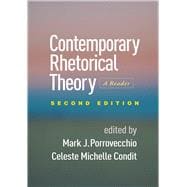An indispensable text--now revised and expanded for the digital age--this volume showcases some of the most important work by contemporary rhetorical theorists. The introduction and section openers frame major problems and questions facing the field. Topics include the epistemological status of rhetoric, how rhetorical address shapes public responses to social and political controversies, the shifting contexts of public communication, how theorists have negotiated the tensions between modernist and postmodernist considerations, mass media, and the relationship between rhetoric and traditionally marginalized groups. A wide range of voices from the 1970s to today are represented, including both classic essays and alternative approaches extending beyond the traditional borders of communication studies.
New to This Edition
*Reflects nearly two decades of major changes in rhetorical theory and practice.
*Includes 17 new articles and new sections on publics and counterpublics, rhetorical personae, and problems of political change.
*Addresses the sweeping impact of the Internet and digital media on the nature of public discourse.
*Shows the relevance of rhetorical theory for understanding current social issues, such as the "Black Lives Matter" movement.
*Fully revised introduction, section openers, and epilogue by the editors.
New to This Edition
*Reflects nearly two decades of major changes in rhetorical theory and practice.
*Includes 17 new articles and new sections on publics and counterpublics, rhetorical personae, and problems of political change.
*Addresses the sweeping impact of the Internet and digital media on the nature of public discourse.
*Shows the relevance of rhetorical theory for understanding current social issues, such as the "Black Lives Matter" movement.
*Fully revised introduction, section openers, and epilogue by the editors.








